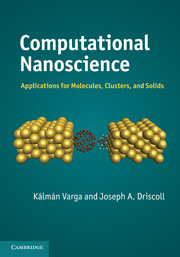Computational Nanoscience Applications for Molecules, Clusters, and Solids
Langue : Anglais
Auteurs : Varga Kálmán, Driscoll Joseph A.

Describes advanced algorithms for students in computational physics, quantum mechanics, atomic and molecular physics, and condensed matter theory.
Computer simulation is an indispensable research tool in modeling, understanding and predicting nanoscale phenomena. However, the advanced computer codes used by researchers are too complicated for graduate students wanting to understand computer simulations of physical systems. This book gives students the tools to develop their own codes. Describing advanced algorithms, the book is ideal for students in computational physics, quantum mechanics, atomic and molecular physics, and condensed matter theory. It contains a wide variety of practical examples of varying complexity to help readers at all levels of experience. An algorithm library in Fortran 90, available online at www.cambridge.org/9781107001701, implements the advanced computational approaches described in the text to solve physical problems.
Preface; Part I. 1D Problems: 1. Variational solution of the Schrödinger equation; 2. Solution of bound state problems using a grid; 3. Solution of the Schrödinger equation for scattering states; 4. Periodic potentials: band structure in 1D; 5. Solution of time-dependent problems in quantum mechanics; 6. Solution of Poisson's equation; Part II. 2D and 3D Systems: 7. 3D real space approach: from quantum dots to Bose–Einstein condensates; 8. Variational calculations in 2D: quantum dots; 9. Variational calculations in 3D: atoms and molecules; 10. Monte Carlo calculations; 11. Molecular dynamics simulations; 12. Tight binding approach to electronic structure calculations; 13. Plane wave density functional calculations; 14. Density functional calculations with atomic orbitals; 15. Real-space density functional calculations; 16. Time-dependent density functional calculations; 17. Scattering and transport in nanostructures; 18. Numerical linear algebra; Appendix: code descriptions; References; Index.
Kálmán Varga is an Assistant Professor in the Department of Physics and Astronomy, Vanderbilt University. His main research interest is computational nanoscience, focusing on developing novel computational methods for electronic structure calculations.
Joseph Driscoll has a PhD in Electrical Engineering from Vanderbilt University, where his research was in the area of intelligent robotics. He has worked in industry as a software developer in the areas of Internet content delivery and bioinformatics. He was an Assistant Professor of Computer Science at Middle Tennessee State University. Dr Driscoll also has a PhD in Physics, where his interests include theoretical and computational physics of nanoscale systems. In 2011 he moved to Bradley University, where he was first an Assistant Professor of Engineering Physics, and then became an Assistant Professor of Electrical and Computer Engineering. Dr Driscoll's primary research areas are intelligent robotics, high-performance computing, and MEMS/NEMS (micro/nano electromechanical system) device simulation. He works with neural networks, genetic algorithms, computer vision, and other forms of artificial intelligence. Many types of robots are used in his experiments, including flying, walking, and wheeled robots.
Joseph Driscoll has a PhD in Electrical Engineering from Vanderbilt University, where his research was in the area of intelligent robotics. He has worked in industry as a software developer in the areas of Internet content delivery and bioinformatics. He was an Assistant Professor of Computer Science at Middle Tennessee State University. Dr Driscoll also has a PhD in Physics, where his interests include theoretical and computational physics of nanoscale systems. In 2011 he moved to Bradley University, where he was first an Assistant Professor of Engineering Physics, and then became an Assistant Professor of Electrical and Computer Engineering. Dr Driscoll's primary research areas are intelligent robotics, high-performance computing, and MEMS/NEMS (micro/nano electromechanical system) device simulation. He works with neural networks, genetic algorithms, computer vision, and other forms of artificial intelligence. Many types of robots are used in his experiments, including flying, walking, and wheeled robots.
Date de parution : 04-2011
Ouvrage de 444 p.
18.1x25.4 cm
Disponible chez l'éditeur (délai d'approvisionnement : 14 jours).
Prix indicatif 98,14 €
Ajouter au panierThème de Computational Nanoscience :
© 2024 LAVOISIER S.A.S.


